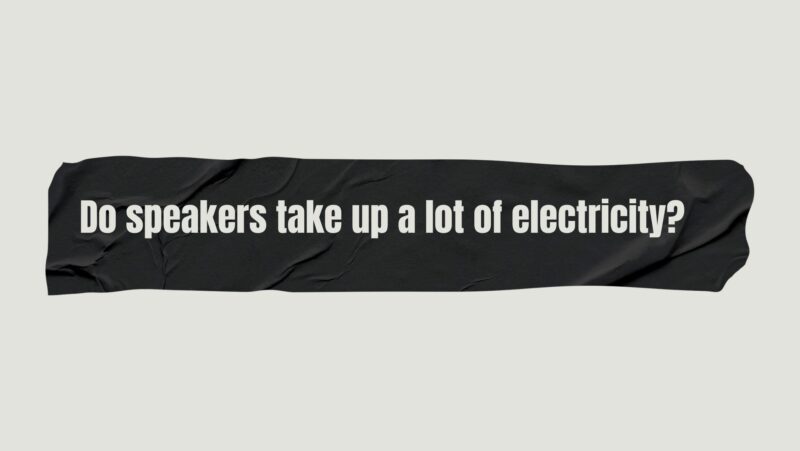In the realm of modern technology, where devices seamlessly integrate into our lives, questions about energy consumption become increasingly relevant. Among these queries, one often asked is, “Do speakers take up a lot of electricity?” This seemingly straightforward question delves into the world of electronics, power efficiency, and environmental impact. In this article, we delve into the intricacies of speaker power consumption to understand the extent to which these sonic companions draw upon our electrical resources.
The Sonic Connection to Energy
Speakers are the conduits through which sound comes to life, transforming electrical signals into audible waves. However, this transformation involves the conversion of energy, which inevitably has implications for electricity consumption. To evaluate whether speakers take up a lot of electricity, we must consider not only the design and technology of the speakers but also the context in which they are used.
Understanding Speaker Power Ratings
When assessing a speaker’s energy consumption, the power rating is a fundamental factor. This rating, often measured in watts, provides insights into the amount of electrical energy a speaker can handle or convert into sound. It’s important to note that the power rating doesn’t directly indicate the speaker’s energy usage but rather its capacity to handle power. Higher-power speakers are typically used in situations where greater volume levels are needed, such as large venues or outdoor events.
Idle Consumption: The Phantom Draw
Beyond active usage, a significant consideration is the speaker’s energy consumption when idle or in standby mode. Many modern speakers incorporate standby functionality for quick activation and remote control. While in standby, these speakers continue to draw a small amount of power to maintain readiness. This phenomenon, known as standby power or vampire power, may seem trivial for individual devices but accumulates significantly when multiplied across numerous devices in households and offices.
The Magnitude of Consumption
The question of whether speakers take up a lot of electricity is subjective and depends on factors such as the type of speakers, their power rating, and usage patterns. Generally, passive speakers that lack built-in amplification consume less power compared to active speakers with integrated amplifiers. A set of active speakers might consume around 10-50 watts when actively playing music, with variations based on volume levels and the efficiency of the speakers.
Energy Efficiency and Technology
Advancements in speaker technology have led to more energy-efficient designs. Some speakers incorporate features like automatic power-off after a period of inactivity to reduce standby power consumption. Energy-efficient amplifier designs and the use of digital signal processing (DSP) can further optimize power usage without compromising audio quality.
Usage Context and Environmental Impact
When evaluating whether speakers take up a lot of electricity, considering the context of usage is crucial. In a professional audio setup for events or recording studios, where high-power speakers are employed, electricity consumption can indeed be considerable. However, in a residential setting or personal audio setup, the impact might be relatively modest, especially if energy-efficient models are chosen.
Making Informed Choices
Consumers hold the power to influence energy consumption by making informed decisions. Opting for energy-efficient models, understanding the implications of standby power, and utilizing power-saving features can collectively contribute to reduced electricity usage. Additionally, user behavior plays a role – turning off speakers when not in use and employing power strips with on/off switches can minimize phantom power consumption.
Balancing Sonic Pleasures and Energy Concerns
As with many technological considerations, the balance between functionality and energy efficiency is key. While high-power speakers might deliver exhilarating sound experiences, they might come with higher energy consumption. This prompts a nuanced evaluation of one’s priorities – choosing speakers that align with audio preferences while also considering energy consciousness.
Conclusion
In the symphony of technology, the question of whether speakers take up a lot of electricity is multifaceted. Speakers, as conduits of sound, do draw upon electrical resources, with the extent varying based on factors such as power ratings, design, and usage patterns. The advent of energy-efficient designs, user awareness, and technological advancements collectively contribute to minimizing the ecological impact of speaker usage.
Ultimately, the pursuit of sonic pleasure need not be at odds with energy consciousness. By understanding power ratings, selecting energy-efficient models, and adopting responsible usage habits, we harmonize the symphony of technology with the rhythm of sustainability. In making informed choices, we ensure that the melodies that fill our lives are not only pleasing to the ear but also considerate of the planet we call home.


